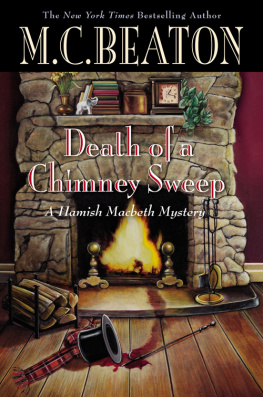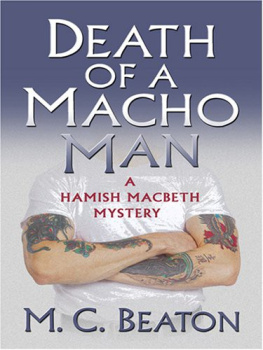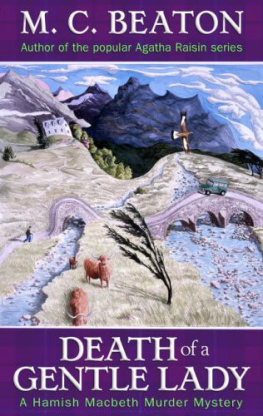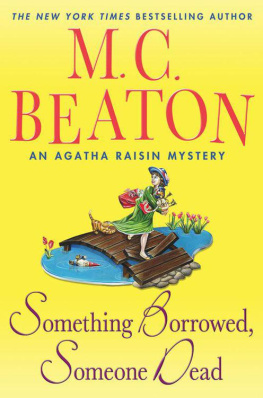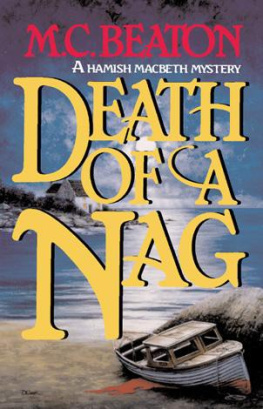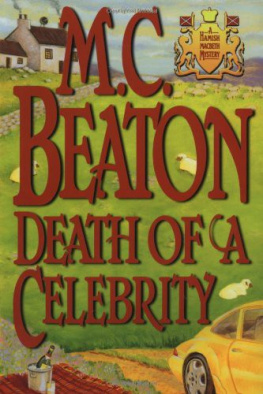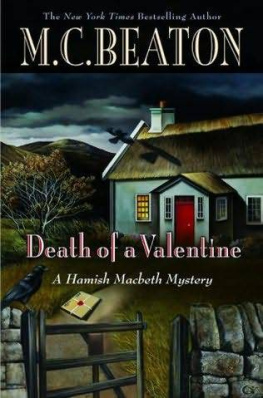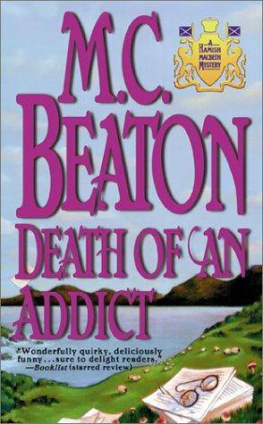M. C. Beaton - Death of a Village
Here you can read online M. C. Beaton - Death of a Village full text of the book (entire story) in english for free. Download pdf and epub, get meaning, cover and reviews about this ebook. year: 2003, publisher: Chivers Press, genre: Detective and thriller. Description of the work, (preface) as well as reviews are available. Best literature library LitArk.com created for fans of good reading and offers a wide selection of genres:
Romance novel
Science fiction
Adventure
Detective
Science
History
Home and family
Prose
Art
Politics
Computer
Non-fiction
Religion
Business
Children
Humor
Choose a favorite category and find really read worthwhile books. Enjoy immersion in the world of imagination, feel the emotions of the characters or learn something new for yourself, make an fascinating discovery.
- Book:Death of a Village
- Author:
- Publisher:Chivers Press
- Genre:
- Year:2003
- Rating:4 / 5
- Favourites:Add to favourites
- Your mark:
- 80
- 1
- 2
- 3
- 4
- 5
Death of a Village: summary, description and annotation
We offer to read an annotation, description, summary or preface (depends on what the author of the book "Death of a Village" wrote himself). If you haven't found the necessary information about the book — write in the comments, we will try to find it.
Death of a Village — read online for free the complete book (whole text) full work
Below is the text of the book, divided by pages. System saving the place of the last page read, allows you to conveniently read the book "Death of a Village" online for free, without having to search again every time where you left off. Put a bookmark, and you can go to the page where you finished reading at any time.
Font size:
Interval:
Bookmark:
Title:
Death of a Village
Series:
Book 19 in the Hamish Macbeth series
Author:
M.C. Beaton
Year:
2003
Synopsis:
Intent on having a quiet time by just sitting in a deck chair in his garden, Hamish Macbeth is quite disturbed when a very agitated Elspeth Grant, Lochdubhs local reporter and astrologer, arrives. It seems that three citizens of nearby Stoyre have moved to Lochdubhbut they are quite unwilling to offer Elspeth any facts as to why, causing the reporter in her to suspect they were frightened out of their former village. So now its up to constable Hamish Macbeth to step into the case and take a small trip to investigate the goings-on in Stoyre. After many frights and dangers, Hamish soon discovers that a sunken German ship from World War I and its cache of gold bullion are the key to solving the strange demise of the once lively village.
In all my travels I never met with any one Scotchman but what was a man of sense. I believe everybody of that country that has any, leaves it as fast as they can.
Francis Lockier
The way propaganda works, as every schoolboy knows, is that if you say the same thing over and over again, lie or not, people begin to believe it.
Hamish Macbeth, police constable of the village of Lochdubh and its surroundings, had been until recently a happy, contented, unambitious man. This was always regarded, by even the housebound and unsuccessful, as a sort of mental aberration. And he had been under fire for a number of years and from a number of people to pull his socks up, get a life, move on, get promotion, and forsake his lazy ways. Until lately, all comments had slid off him. That was, until Elspeth Grant, local reporter, joined the chorus. It was the way she laughed at him with a sort of affectionate contempt as he mooched around the village that got under his skin. Her mild amazement that he did not want to better himself, added on to all the other years of similar comments, finally worked in him like the end result of a propaganda war and he began to feel restless and discontented.
Had he had any work to do apart from filing sheep-dip papers and ticking off the occasional poacher, Elspeths comments might not have troubled him. And Elspeth was attractive, although he would not admit it to himself. He felt he had endured enough trouble from women to last him a lifetime.
He began to watch travel shows on television and to imagine himself walking on coral beaches or on high mountains in the Himalayas. He fretted over the fact that he had even taken all his holidays in Scotland.
One sunny morning, he decided it was time he got back on his beat, which covered a large area of Sutherland. He decided to visit the village of Stoyre up on the west coast. It was more of a hamlet than a village. No crime ever happened there. But, he reminded himself, a good copper ought to check up on the place from time to time.
After a winter of driving rain and a miserable spring, a rare period of idyllic weather had arrived in the Highlands. Tall twisted mountains swam in a heat haze. The air through the open window of the police Land Rover was redolent with smells of wild thyme, salt, bell heather, and peat smoke. He took a deep breath and felt all his black discontentment ebb away. Damn Elspeth! This was the life. He drove steadily down a winding one-track road to Stoyre.
Tourists hardly ever visited Stoyre. This seemed amazing on such a perfect day, when the villages cluster of whitewashed houses lay beside the deep blue waters of the Atlantic. There was a little stone harbour where three fishing boats bobbed lazily at anchor. Hamish parked in front of the pub, called the Fishermans Arms. He stepped down from the Land Rover. His odd-looking dog, Lugs, scrambled down as well.
Hamish looked to right and left. The village seemed deserted. It was very still, unnaturally so. No children cried, no snatches of radio music drifted out from the cottages, no one came or went from the small general stores next to the pub.
Lugs bristled and let out a low growl. Easy, boy, said Hamish. He looked up the hill beyond the village to where the graveyard lay behind a small stone church. Perhaps there was a funeral. But he could see no sign of anyone moving about.
Come on, boy, he said to his dog. He pushed open the door of the pub and went inside. The pub consisted of a small whitewashed room with low beams on the ceiling. A few wooden tables scarred with cigarette burns were dotted about. There was no one behind the bar.
Anyone home? called Hamish loudly.
To his relief there came the sound of someone moving in the back premises. A thickset man entered through a door at the back of the bar. Hamish recognised Andy Crummack, the landlord and owner.
Hows it going, Andy? asked Hamish. Everybody dead?
It iss yourself, Hamish. What will you be having?
Just a tonic water. Hamish looked round the deserted bar. Where is everyone?
Its aye quiet this time o day. Andy poured a bottle of tonic water into a glass.
Slainte! said Hamish. Are you having one?
Too early. If ye dont mind, Ive got stock to check. Andy made for the door behind the bar.
Hey, wait a minute, Andy. I havenae been in Stoyre for a while but Ive never seen the place so dead.
Were quiet folks, Hamish.
And nothings going on?
Nothing. Now, if ye dont mind
The landlord disappeared through the door.
Hamish drank the tonic water and then pushed back his peaked cap and scratched his fiery hair. Maybe he was imagining things. He hadnt visited Stoyre for months. The last time had been in March when hed made a routine call. He remembered people chatting on the waterfront and this pub full of locals.
He put his glass on the bar and went out into the sunlight. The houses shone white in the glare and the gently heaving blue water had an oily surface.
He went into the general store. Morning, Mrs. MacBean, he said to the elderly woman behind the counter. Quiet today. Where is everyone?
Theyll maybe be up at the kirk.
What! On a Monday? Is it someones funeral?
No. Can I get you anything, Mr. Macbeth?
Hamish leaned on the counter. Come on. You can tell me, he coaxed. Whats everyone doing at the church on a Monday?
We are God-fearing folk in Stoyre, she said primly, and Ill ask you to remember that.
Baffled, Hamish walked out of the shop and was starting to set off up the hill when the church doors opened and people started streaming out. Most were dressed in black as if for a funeral.
He stood in the centre of the path as they walked down towards him. He hailed people he knew. Morning, Jockgrand day, Mrs. Nisbett, and so on. But the crowd parted as they reached him and silently continued on their way until he was left standing alone.
He walked on towards the church and round to the manse at the side with Lugs at his heels. The minister had just reached his front door. He was a new appointment, Hamish noticed, a thin nervous man with a prominent Adams apple, and his black robes were worn and dusty. He had sparse ginger hair, weak eyes, and a small pursed mouth.
Morning, said Hamish. I am Hamish Macbeth, constable at Lochdubh. You are new to here?
The minister reluctantly faced him. I am Fergus Mackenzie, he said in a lilting Highland voice.
You seem to be doing well, remarked Hamish. Church full on a Monday morning.
There is a strong religious revival here, said Fergus. Now, if you dont mind
I do mind, said Hamish crossly. This village has changed.
It has changed for the better. A more God-fearing community does not exist anywhere else in the Highlands. And with that the minister went into the manse and slammed the door in Hamishs face.
Font size:
Interval:
Bookmark:
Similar books «Death of a Village»
Look at similar books to Death of a Village. We have selected literature similar in name and meaning in the hope of providing readers with more options to find new, interesting, not yet read works.
Discussion, reviews of the book Death of a Village and just readers' own opinions. Leave your comments, write what you think about the work, its meaning or the main characters. Specify what exactly you liked and what you didn't like, and why you think so.

